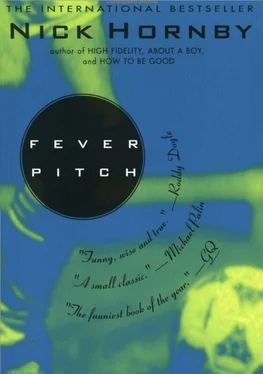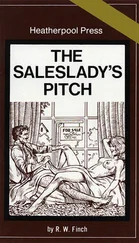From the moment we arrived at the camp, though, I was dreadfully, overwhelmingly homesick. I knew that I was going to find it impossible to get through the ten days away; each morning began with a reverse charge call to my mother, during which I would sob pathetically and embarrassingly down the line back home. I was aware that this sort of behaviour was quite unbelievably feeble, and when an older scout was assigned to talk to me in order to discover what was wrong, I told him about the divorce with a shameless eagerness: it was the only explanation I could come up with that would in any way excuse my cissy longing to see my mother and my sister. It did the trick. For the rest of the holiday I was treated with a reverential pity by the rest of the campers.
I blubbed and dripped through the first week, but it wasn’t getting any easier, and on the Saturday my father was dispatched from his Midlands base down to see me. Saturday, of course, was the hardest day of all. I was stuck in some stupid Welsh field for the first home game of the season, and my sense of displacement was all the more acute.
I had missed football in the preceding months. The summer of ’69 was the first in my life in which something seemed to be lacking. My dad and I were faced with pre-Arsenal problems; the sports pages no longer held any interest for me (in those days, before Gazza, before cynical and meaningless pre-season tournaments which somehow still offer a methadone alternative to the real competitions to come, before the ludicrous freneticism of the contemporary transfer market, the newspapers went weeks on end without even mentioning football); and we weren’t allowed on to the tennis courts at school to kick a ball around. I had longed for and welcomed the previous summers, but this one destroyed so many routines I had come to rely on that it seemed to stifle rather than liberate—as if July and November had swapped places.
Dad arrived at the camp-site in mid afternoon. We walked over to a rock on the edge of the field and sat down; he talked about how little difference the divorce itself would make to our lives, and how we would be able to go to Highbury much more frequently next season. I knew he was right about the divorce (although to admit as much would have rendered his two hundred mile round-trip unnecessary), but the football promise seemed hollow. What, in that case, were we doing sitting on a rock in Wales when Arsenal were playing Everton? Quite a way back down the line my self-pity had got the better of me. I really did blame it all—the terrible food, the nightmarish walks, the cramped, uncomfortable tents, the revolting, fly-plagued holes we were supposed to crap into, and, worst of all, the two empty seats in the West Stand—on the fact that I was the child of estranged parents, the product of a broken home; in fact, I was on a scout camp in the middle of Wales because I had joined the scouts. Not for the first time in my life, and certainly not for the last, a self-righteous gloom had edged out all semblance of logic.
Just before five, we went back to my tent to listen to the results. Both of us knew that to a large extent the success of my father’s mission depended not on his ability to reassure or persuade but on the news from north London, and I think my father was praying even harder than usual for a home win. I hadn’t really been listening to him for the previous twenty minutes anyway. He sat down on somebody else’s sleeping bag, an incongruous figure in his immaculate sixties young executive casual gear, and we tuned in to Radio 2. The Sports Report theme made my eyes water again (in a different, better world we would be sitting on the hot leather seats of Dad’s company car, trying to push through the traffic, and humming along); when it was over, James Alexander Gordon announced a 1-0 home defeat. Dad slumped back against the canvas, tired, knowing now that he’d been wasting his time, and I went back home the next afternoon.
ARSENAL v NEWCASTLE
27.12.69
“All those terrible nil-nil draws against Newcastle,” my father would complain in years to come. “All those freezing, boring Saturday afternoons.” In fact, there were only two terrible nil-nil draws against Newcastle, but they occurred in my first two seasons at Highbury, so I knew what he meant, and I felt personally responsible for them.
By now I felt guilty about what I had got my father into. He had developed no real affection for the club, and would rather, I think, have taken me to any other First Division ground. I was acutely aware of this, and so a new source of discomfort emerged: as Arsenal huffed and puffed their way towards 1-0 wins and nil-nil draws I wriggled with embarrassment, waiting for Dad to articulate his dissatisfaction. I had discovered after the Swindon game that loyalty, at least in football terms, was not a moral choice like bravery or kindness; it was more like a wart or a hump, something you were stuck with. Marriages are nowhere near as rigid—you won’t catch any Arsenal fans slipping off to Tottenham for a bit of extra-marital slap and tickle, and though divorce is a possibility (you can just stop going if things get too bad), getting hitched again is out of the question. There have been many times over the last twenty-three years when I have pored over the small print of my contract looking for a way out, but there isn’t one. Each humiliating defeat (Swindon, Tranmere, York, Walsall, Rotherham, Wrexham) must be borne with patience, fortitude and forbearance; there is simply nothing that can be done, and that is a realisation that can make you simply squirm with frustration.
Of course I hated the fact that Arsenal were boring (I had by now conceded that their reputation, particularly at this stage in their history, was largely deserved). Of course I wanted them to score zillions of goals and play with the verve and thrill of eleven George Bests, but it wasn’t going to happen, certainly not in the foreseeable future. I was unable to defend my team’s inadequacies to my father—I could see them for myself, and I hated them—and after each feeble attempt at goal and every misplaced pass I would brace myself for the sighs and groans from the seat next to me. I was chained to Arsenal and my dad was chained to me, and there was no way out for any of us.
BRAZIL v CZECHOSLOVAKIA
June 1970
Until 1970, people of my age and a good few years older knew more about Ian Ure than they did about the greatest player in the world. We knew that he was supposed to be pretty useful, but we had seen very little evidence of it: he had literally been kicked out of the 1966 tournament by the Portuguese, but he hadn’t really been fit anyway, and nobody I knew could remember anything about Chile in 1962. Six years after Marshall McLuhan published Understanding Media , a good three-quarters of the population of England had about as clear a picture of Pelé as we’d had of Napoleon one hundred and fifty years before.
Mexico ’70 introduced a whole new phase in the consumption of football. It had always been a global game in the sense that the whole world watched it and the whole world played it; but in ’62, when Brazil retained the World Cup, television was still a luxury rather than a necessity (and in any case the technology required to relay the games live from Chile didn’t exist), and in ’66 the South Americans had performed poorly. Brazil were eliminated before the knock-out stage; Argentina went unnoticed until their elimination by England in the quarter-finals, when their captain Rattin was sent off but refused to walk, and Sir Alf referred to them as animals. The only other South American team in the last eight, Uruguay, got thumped 4-0 by Germany. In effect, 1970 was the first major confrontation between Europe and South America that the world had had the opportunity to witness. When Czechoslovakia went one up in Brazil’s opening game, David Coleman observed that “all we ever knew about them has come true”; he was referring to Brazil’s sloppy defence, but the words are those of a man whose job it was to introduce one culture to another.
Читать дальше











